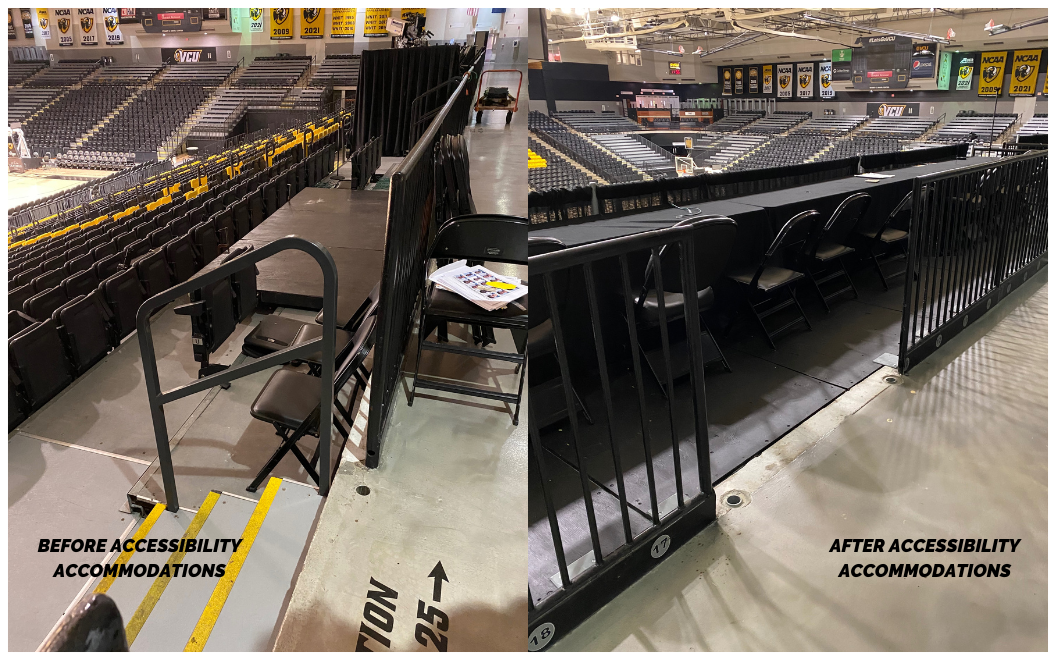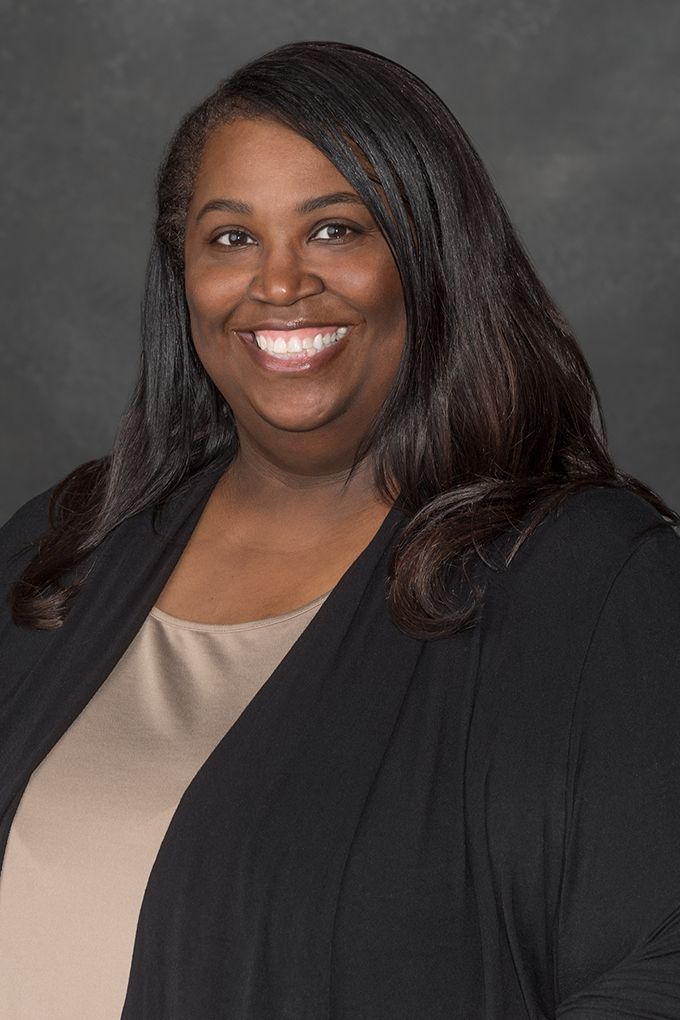Equity and Access Services leads the charge in making VCU a top accessibility urban campus

VCU’s integration within the City of Richmond poses unique accessibility challenges. The university’s inaugural chief accessibility officer will help address those challenges, improving the landscape of both VCU campus and Richmond in the process.
Not many public universities in the nation have a chief accessibility officer. Virginia Commonwealth University counts itself among the select few that does have one.
Katy Washington, J.D., Ph.D., is VCU’s inaugural chief accessibility officer, a role housed within Equity and Access Services (EAS). Washington is also president of the Association on Higher Education and Disability (AHEAD) and brings 18 years of experience working in disability services. In her role, Washington will provide expertise and be an advocate for accessibility at VCU. The chief accessibility officer will report to the associate vice president of institutional equity in the Office of Institutional Equity, Effectiveness and Success, Cleopatra Magwaro, and have a dotted line to the vice president for administration, Meredith Weiss.
Magwaro stated, “This new role is pivotal to VCU’s goal of becoming a top accessibility urban campus. While some universities are built from the ground up within college towns, VCU is integrated throughout the City of Richmond, seamlessly.” Our campus sprawls across the region, creating what Magwaro calls “a truly borderless community,” that only continues to grow. This makes VCU an exciting place to learn and live, but also poses distinct accessibility challenges. For instance, constructing every new building from scratch isn’t an option. With new buildings, people can actively plan for accessibility needs such as elevators, bathrooms and classrooms. VCU, being an urban campus, often has to purchase older buildings, which can be much more difficult to renovate.
VCU needs to have greater collaborations throughout the entire enterprise in order for us to transform lives through human-centered practices. The chief accessibility officer is going to help us champion that.
Cleo Magwaro, associate vice president of institutional equity
“The new chief accessibility officer is working through BenchmarkABILITY™, a Cornell University self-assessment tool on leading practices that promote disability inclusive spaces, that VCU launched in 2021,” says Magwaro, who served as interim ADA and accessibility coordinator for a year before the chief accessibility officer role was filled. “We need accessibility maps, lactation rooms, gender inclusive spaces as well as meditation wellness spaces–to name a few. VCU needs to have greater collaborations throughout the entire enterprise in order for us to transform lives through human-centered practices. The chief accessibility officer is going to help us champion that,” Magwaro says.
Those collaborations will include specialists from a number of different fields, including IT, Facilities Management, real estate and planning and design architects, just to name a few. An integral part of Washington’s role will be to help facilitate those collaborations and educate university leaders and partners on what accessibility is and how to sustainably achieve it.
Understanding the language of accessibility

“Accessibility is a word that sounds complicated,” Washington says. “Because it sounds complicated, it doesn’t have dimension, so it’s easy for people to say they don’t understand what it is or how to do it. It’s important to develop an understanding around the language of accessibility.”
Madeline Doane, a recent VCU grad, knows this well. During their sophomore year at VCU, Doane broke both of their feet, becoming temporarily physically disabled. Suddenly, VCU’s urban campus became treacherous for them to navigate, especially while using a motorized scooter to cross busy Richmond streets. Once, she got stuck in a campus bathroom stall for nearly half an hour.
“Because I hadn’t really come to terms with the fact that I had physical disabilities, I didn’t feel like I could be in spaces with people with permanent disabilities. I just felt really alone and that all of these things I was experiencing were my fault or were character flaws,” says Doane. Many people feel this way precisely because there aren’t enough large-scale conversations happening about accessibility. It’s often said that anyone can become a person with disabilities at any time. When we don’t have those important conversations and learn the common language of accessibility, as Washington puts it, we do a disservice to both people with disabilities and to ourselves.
“Without having an understanding of what being disabled can mean or look like, it led to a lot of self-sabotaging and not knowing how or where to ask for help,” Doane explains. “So I think increased visibility is super important as well as acknowledging that there are spaces whether physically or otherwise that aren’t accessible, and I think that awareness component is really important. As an alum, the work being done in the Equity and Access Services office resonates with me, and I imagine that folks currently at VCU or considering going to VCU will be happy to hear that these projects are underway.”
Accommodations don’t have to be expensive
Glynis Boyd Hughes, a VCU alum, faced a myriad of challenges as a nontraditional student. As an adult student with an overnight job, it was difficult for her to submit assignments on the same schedule as her younger peers, and she didn’t feel like the resources were in place for her to advocate for herself. Hughes also observed people close to her having difficulties receiving physical accommodations, even with the proper medical documentation. She shares a story about a friend who cannot take in-person classes at VCU because their size prohibits them from using the provided desks and chairs, and that the friend must take virtual classes instead.
“I hope we start talking about disabilities not as a hindrance, but as an identity,” says Hughes. “I have a lot of faith in VCU, I think that VCU does great things, I do. No one’s perfect and I am a VCU fan. And because I’m a fan, I want us to have these conversations…No matter who you are at VCU, you deserve to have a positive experience.”
We want VCU to be the university that people look to for examples of how accessibility should work on campus.
Katy Washington, J.D., Ph.D., VCU’s inaugural chief accessibility officer
While building renovations are essential for accessibility, physical accommodations don’t have to be expensive. An important and often life-changing accommodation comes at nearly no cost: the ability to work remotely. Katie Cappuccio, a financial specialist for the Division of Strategic Enrollment Management and Student Success and a member of VCU Staff Senate‘s Accessibility and Inclusivity Working Group, can attest to this. Cappuccio, who has several autoimmune conditions, worked in-person prior to the pandemic. Between missing work for surgeries and commuting to campus to sit while working all day, she lived–and sometimes suffered–with chronic pain.
“Post-pandemic I moved to a different department on the Monroe Park Campus in which the job is permanently remote and it has truly changed my quality of life,” says Cappuccio. ”I can say with 100% confidence that I am a better employee working from home to deal with several autoimmune conditions as opposed to getting myself together to do the same job on campus.”
Ian Kunkes, director of the VCU Office of Student Accessibility and Educational Opportunity stated, “We are already looked at as a national standard for the provision of disability-related services and support for our students. I am confident that Katy’s arrival at the university will help further these efforts and elevate the conversation at a national level.”
“We want VCU to be the university that people look to for examples of how accessibility should work on campus,” Washington says. Making that a reality will truly require an enterprise-wide effort. There’s work to go around, from demystifying accessibility as a concept, to educating people on what accessibility means and how to advocate for it, to actually building the infrastructure that allows everybody to thrive, including neurodivergent people and people with disabilities.
“The work is bigger than EAS,” Washington says. “I am humbled by this opportunity and I’m really excited to see what we can do on this campus.”
Categories EAS